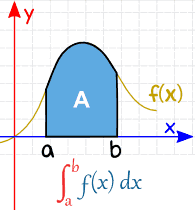The value of \(\int_{0}^{\frac{1}{2}}\frac{dx}{\sqrt{1-x^{2n}}}\) is (n∈N)
- less than or equal to \(\frac{\pi}{6}\)
- greater than or equal to 1
- less than \(\frac{1}{2}\)
- greater than \(\frac{\pi}{6}\)
The Correct Option is B
Solution and Explanation
To solve the integral: \[ \int_0^{1/2} \left( \frac{1}{\sqrt{1 - x^2}} \right)^n dx \] Note that: \[ \frac{1}{\sqrt{1 - x^2}} = \frac{d}{dx} \arcsin x \] But since the integrand is raised to the power n, we cannot directly integrate unless n = 1. Let's analyze: \[ \left( \frac{1}{\sqrt{1 - x^2}} \right)^n = ( \arcsin' x )^n \] This is increasing on the interval \([0, 1/2]\), and for \(x \in [0, 1/2]\), \(\frac{1}{\sqrt{1 - x^2}} \geq 1\). So: \[ \left( \frac{1}{\sqrt{1 - x^2}} \right)^n \geq 1^n = 1 \] Hence: \[ \int_0^{1/2} \left( \frac{1}{\sqrt{1 - x^2}} \right)^n dx \geq \int_0^{1/2} 1 \, dx = \frac{1}{2} \] But even more tightly, since the integrand is always greater than or equal to 1 on \([0, 1/2]\), and increases as x approaches 1/2, the integral value is always: \[ \int_0^{1/2} \left( \frac{1}{\sqrt{1 - x^2}} \right)^n dx \geq 1 \] Therefore, the correct answer is: Option (B): greater than or equal to 1
Top Questions on Some Properties of Definite Integrals
- The value of \[ \int_{-\pi/6}^{\pi/6} \left( \frac{\pi + 4x^{11}}{1 - \sin\left(|x| + \frac{\pi}{6}\right)} \right) dx \] is equal to
- JEE Main - 2026
- Mathematics
- Some Properties of Definite Integrals
- The number of elements in the set \[ S = \left\{ x : x \in [0,100] \text{ and } \int_{0}^{x} t^2 \sin(x - t)\,dt = x^2 \right\} \] is
- JEE Main - 2026
- Mathematics
- Some Properties of Definite Integrals
- \(6 \int_{0}^{\pi} (\sin 3x + \sin 2x + \sin x)dx\) is equal to:
- JEE Main - 2026
- Mathematics
- Some Properties of Definite Integrals
- Find the area bounded by \( y = \max \{ \sin x, \cos x \} \) when \( x \in \left[ 0, \frac{3\pi}{2} \right] \) with the x-axis:
- JEE Main - 2026
- Mathematics
- Some Properties of Definite Integrals
- The value of \[ \int_{\frac{\pi}{24}}^{\frac{5\pi}{24}} \frac{1}{1 + \sqrt{\tan 2x}} \, dx \] is:
- JEE Main - 2026
- Mathematics
- Some Properties of Definite Integrals
Questions Asked in WBJEE exam
- Figure shows the graph of angle of deviation \( \delta \) versus angle of incidence \( i \) for a light ray striking a prism. The prism angle is

- WBJEE - 2025
- Refraction Through A Prism
- Ruma reached the metro station and found that the escalator was not working. She walked up the stationary escalator with velocity \( v_1 \) in time \( t_1 \). On another day, if she remains stationary on the escalator moving with velocity \( v_2 \), the escalator takes her up in time \( t_2 \). The time taken by her to walk up with velocity \( v_1 \) on the moving escalator will be:
- WBJEE - 2025
- Relative Motion
- The compound(s) showing optical activity is/are
- WBJEE - 2025
- Stoichiometry and Stoichiometric Calculations
Which of the following statement(s) is/are correct about the given compound?

- WBJEE - 2025
- Organic Chemistry
- X is an extensive property and x is an intensive property of a thermodynamic system. Which of the following statement(s) is (are) correct?
- WBJEE - 2025
- Thermodynamics
Concepts Used:
Definite Integral
Definite integral is an operation on functions which approximates the sum of the values (of the function) weighted by the length (or measure) of the intervals for which the function takes that value.
Definite integrals - Important Formulae Handbook
A real valued function being evaluated (integrated) over the closed interval [a, b] is written as :
\(\int_{a}^{b}f(x)dx\)
Definite integrals have a lot of applications. Its main application is that it is used to find out the area under the curve of a function, as shown below:
